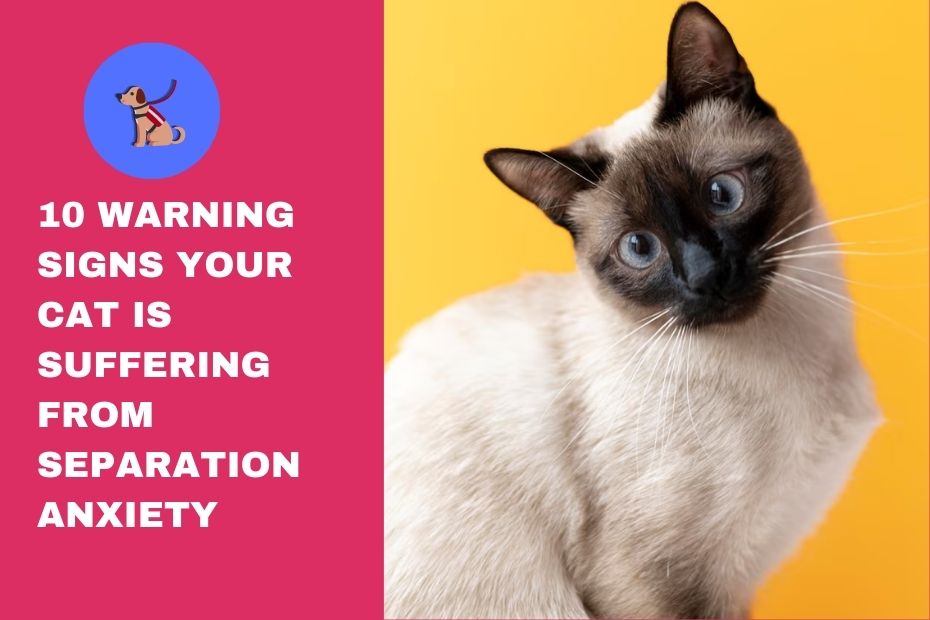While cats have long been known for their independent nature, many cat owners are surprised to learn that their feline companions can suffer from separation anxiety. This condition, more commonly associated with dogs, can cause serious emotional and behavioral issues in cats when left alone. If your cat seems stressed or acts out while you’re away, it may be experiencing separation anxiety.
Here are 10 clear warning signs to watch for — recognizing these early can help you take steps to ease your cat’s distress and improve its well-being.
1. Excessive Meowing or Yowling
If your cat becomes unusually vocal when you’re about to leave or after you return, it may be trying to express anxiety or fear. This vocalization often sounds different — louder, more insistent, or even mournful.
2. Destructive Behavio
Cats suffering from separation anxiety might scratch doors, chew cords, or knock over objects while you’re gone. This isn’t mischief; it’s their way of coping with stress and seeking attention or relief.
3. Over-Grooming or Hair Loss
Self-soothing behaviors like excessive grooming can be a major red flag. If you notice bald spots, especially on the belly or legs, your cat may be licking excessively to relieve anxiety.
4. Litter Box Issue
Urinating or defecating outside the litter box—especially on your belongings like clothing or bedding—can be a sign your cat is distressed by your absence. This isn’t defiance; it’s often a call for comfort.
5. Clinginess When You’re Home
Does your cat follow you from room to room, sit on your laptop, or demand attention the moment you’re back? While some cats are naturally affectionate, sudden or excessive clinginess can be a warning sign.
6. Lack of Appetite
If your cat eats less (or not at all) while you’re away, that’s a concerning sign. Cats with separation anxiety might lose interest in food, which can lead to weight loss or nutritional issues.
7. Pacing or Restlessness
You might notice your cat pacing along windowsills, near doors, or in circles when you’re getting ready to leave. This anxious behavior shows your cat is uneasy and anticipates your departure.
8. Hiding More Often
While some cats enjoy a good hideaway, a noticeable increase in hiding—especially right before or after your absence, can signal emotional distress or fear related to separation.
9. Trying to Escape
Some anxious cats may attempt to escape through doors or windows to follow you or seek comfort. This behavior can be dangerous and requires immediate attention.
10. Vomiting or Diarrhea
Stress can affect your cat’s gastrointestinal system. If your vet rules out medical causes, recurring digestive issues, especially when tied to your absence, could be anxiety-driven.
How to Help Your Cat Cope
If your cat shows signs of separation anxiety, don’t panic—there are ways to help:
- Create a comforting environment: Leave out familiar items, use calming pheromones, and play soft music.
- Stick to a routine: Cats feel secure when things happen predictably.
- Provide enrichment: Puzzle feeders, cat trees, and interactive toys can keep your cat mentally stimulated while you’re gone.
- Consider a companion pet: In some cases, another cat may help reduce loneliness.
- Consult your vet: They can rule out medical issues and recommend behavioral strategies or medications.
Final Thoughts
Cats may not always show their emotions openly, but that doesn’t mean they don’t feel deeply. Separation anxiety is real, and recognizing the signs early is key to helping your feline friend feel safe and secure. By staying attentive and responsive to your cat’s needs, you can nurture a healthier, happier relationship for both of you.
FAQ’s
What is separation anxiety in cats?
Separation anxiety in cats is a behavioral condition where a cat experiences excessive stress and anxiety when left alone. This can lead to various signs, such as destructive behavior, excessive meowing, and loss of appetite.
Can separation anxiety be cured in cats?
While separation anxiety can’t always be “cured,” it can be managed with consistent behavior modification techniques, creating a calming environment, and, in some cases, medications prescribed by your vet.
How can I help my cat with separation anxiety?
To help your cat cope, ensure they have plenty of enrichment, a consistent routine, and comforting items while you’re gone. If necessary, consult your vet for additional solutions, such as calming pheromones or anxiety-reducing medications.
